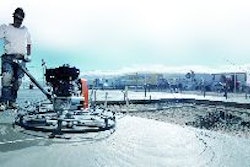
Understanding how business people make decisions is a very complicated topic. There is plenty of subject matter here to write books about, so I am going to narrow our discussion into three areas.
- Understanding how fear influences decision making and business strategy.
- How not to allow complacency to creep in.
- The Parkinson Principal and how to fight it.
As we have been traveling across the country delivering motivational and functional sales workshops there is a solemn sense of fear in most of the attendee's faces. There are not too many smiles in the audience these days.
We wish the new seriousness was due to a heightened commitment to running their business right. The reality is that most owners are petrified of the rapidly shrinking construction activity! They are being consumed by - FEAR!
Even if your business is doing well, you can't ignore the signs that so many others are in distress. Bad news is plastered everywhere! No news outlet has spared us of the gruesome details. Yes, the economy stinks to high heaven.
What is everybody afraid of?
Will they have a job? How they will survive? How they will pay their financial obligations? All legitimate concerns. But FEAR and its close cousin panic will not help you. They hinder sound decision making.
Fear is simply an acronym for False Evidence Appearing Real. Many an intuitive entrepreneurial contractor who have historically made decisions based on facts have now resorted to inferior analysis and panic-driven decisions that produce poor or disastrous results.
Let's look at how to offset the doomsday fear and minimize its impact on decision making and business strategy.
Figure out how your company is going to out-do your competition.
Figure out which financial actions will create flexibility now and in the immediate future.
Figure out which financial steps will protect yourself against a patch of bad luck without going overboard and shutting off your ability to complete jobs.
For an example of a trap to avoid, contractors will be eager to purchasing equipment because there are some really good deals out there. A classic mistake. Do not increase your fleet unless you have the sales today or in the near term to support the addition of more equipment.
Examine where are you with your marketing and sales systems. Do you have a plan? Did you scale back your investment, expectations, and projections? Are you guaranteeing a shrinkage of sales by cutting back on your marketing and selling efforts?
Deal with facts not fear
Don't project or hope for situations that probably won't materialize. Cut out excesses such as unnecessary overtime and shop time. If you must pare down your workforce, keep your very best people no matter what they cost you. You need to be able to gear up and ratchet down your human resource band-width quickly to remain cost competitive and profitable.
In the bestselling book, Who Moved My Cheese, the four characters all handle change differently. It is a quick, insightful story about change. There is one character, Hem, who refuses to leave the "cheese station" once the cheese is gone. Hem decides to stays in the empty "cheese station" and starves to death. Hem is afraid of change.
Be prepared to Move Your Cheese! Change can be good! Go through your customer files to mine golden nuggets from past satisfied clients you haven't kept in contact with. Look for markets that are still prospering.
Right now, there is a very fine line between being profitable and losing money. A single isolated event could tip your company in the red. In today's environment you MUST make sound, prudent, timely decisions.
This leads into the second phenomena; which we will call COMPLACENCY. Complacency is the opposite side of the coin from fear - but it's probably three times as deadly!
Often, a total lack of action to surrounding circumstances can lead to a venomous painful death. This would be our similar to my old friend "Hem" in the Who Moved My Cheese book.
One of the solutions is a continuous and sustainable sense of urgency. Don't mistake panic for a true sense of urgency. Panic is running around doing things hap-hazard that do not fire your bullets at the targets that make a difference.
Urgency focuses efforts on the critical success factors that need to be accomplished, while allowing you to win as a team. You need to identify these success factors. And you need to act on them. Below I list a few that are universal to most contractors:
- Master accurate job costing.
- Increase lead generation by defining and expanding your marketing plan.
- Maintain or increase sales by pre-qualifying your sales leads.
- Cease chasing unprofitable jobs or ones that don't fit your capabilities.
- Follow-up, follow-up, follow up with all your prospects and customers.
- Curb all unnecessary spending.
- Make sure you have the right people on your bus and drive it to success.
Now you have other success factors that I have not identified. Identify them and implement solutions for them too.
Time to introduce you to the Parkinson Principal. The simple definition of the Parkinson Principal is: "work expands to fill the time available". Think about the essence of that statement.
If you give an individual a task and a long deadline, how often is the task completed early? How fast would the task have been performed if it was approached with a true sense of urgency?
If your workers' attitude is "We are going to get paid for eight hours today, and the work could be accomplished in five, but we'll take the whole eight hours." you have fallen prey to the Parkinson trap.
Stop that mindset fast in its tracks!
As a contractor one of you biggest expenses you have is labor. If you build a sense of urgency in everything your team does, you can win big.
The companies that are agile, willing to make changes; even if they are out of your comfort zone, face their fears and operate with a united sense of urgency are going to survive. Many will even be stronger in the future - won't you joint them?




















